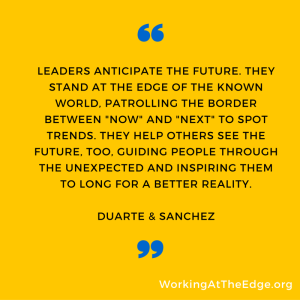 In the book Illuminate from Nancy Duarte and Patti Sanchez there is an inspiring quote reminding us of one of the primary responsibilities of leadership today:
In the book Illuminate from Nancy Duarte and Patti Sanchez there is an inspiring quote reminding us of one of the primary responsibilities of leadership today:
Leaders anticipate the future. They stand at the edge of the known world, patrolling the border between “now” and “next” to spot trends. They help others see the future, too, guiding people through the unexpected and inspiring them to long for a better reality. (pg. 9)
So much of our work as leaders is to help our organizations continually move forward. This is challenging work, especially in public education where there are an increasing number of compliance issues placed before us. As leaders, it can be overwhelming to find the time and energy to “stand at the edge” and spot the next trends. One of the areas we need to explore more carefully and bring to the forefront of every visioning conversation is tomorrow’s economy and the careers it will bring. Parents and leaders need to be asking this question:
What will it take for today’s learners to compete, succeed and thrive in tomorrow’s economy?
While nobody really knows what tomorrow will bring for our high school graduates, let’s start learning what the experts have to say. A very good start is Alec Ross’s book The Industries of the Future. Throughout the book, Ross shares an economic and geopolitical perspective on our future – “Robots that care for us as we grow old. Cyberattacks against our homes. Extinct animals brought back to life. Ubiquitous sensors eliminating privacy as we now know it.” (pg. 240) In the final chapter, he also asks a variation of the question above and offers a few ideas based on data from interviews for the book.
- Today’s learners will need an understanding of how the real world works as their careers and lives will be played out in a global context. He suggests that traveling to lesser known cultures (currently less-glamorous places that will be the markets of tomorrow) is one way young people can gain this real world, global perspective.
- Coupled with a global perspective is the need for multi-cultural fluency that can be developed through a curiosity for world languages and cultures.
- In addition to fluency in other languages, learners will need fluency in a technical or scientific language such as coding, helping learners to understand the technical world in which we live.
What other resources can school leaders and parents access to learn more about tomorrow’s economy? What do our learners need now to compete, succeed and thrive in the future?
Connect with Randy on Twitter and on the TLTalkRadio podcast!
Get new content delivered to your inbox and the ebook 3 Key Principles of Digital Transformation. The ebook contains valuable information from my experience leading a digital transformation and working with a variety of stakeholders over the past decade.
- A silver lining - January 22, 2022
- Is our use of tech working against us? 🤔 - September 8, 2021
- What’s NOT going to change in the next 10 years? 🤔 - September 7, 2021